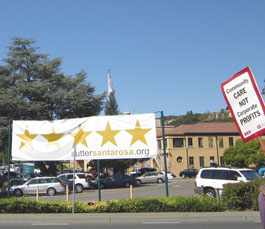home | north bay bohemian index | news | north bay | news article

Photograph by Leilani Clark
RN REVENGE: Nurses are fighting for what they call 'takeaways'—existing benefits that Sutter is trying to eliminate.
Hospital Heartbeat
While posting record revenues, why is Sutter Health negotiating to lower benefits and cut staff?
By Leilani Clark
It happens over and over again, says Nancy Anderson. A phone rings off the hook, or the doorbell to the locked ward buzzes, and Anderson, a registered nurse in the neonatal intensive care unit at Sutter Medical Center in Santa Rosa, is forced to exit her consultation and care of parents and newborns to answer the call. In addition, she and the other RNs stock supplies, clean equipment, put name stickers on charts and wipe down counters, responsibilities once handled by a full-time clinical service assistant staff.
"Most days we don't have a clinical service assistant," says Anderson, an RN for over 30 years. "It really can take away from time with our patients. That's what bugs us the most. We're answering doorbells instead of hands-on time with the mother, talking with the family, comforting the family."
Anderson is a member of the California Nurses Association, an arm of the 150,000-strong labor union National Nurses United, and lowered staffing ratios is just one of the issues in contract negotiations with Sutter. On Sept. 22, 23,000 RNs at 34 Northern and Central California hospitals, including Sutter Health-affiliated hospitals and Kaiser-Permanente, held a one-day strike.
According to CNA, Sutter is asking for cuts to healthcare benefits and medical leave, as well as an elimination of charge nurses, extra nurses who help stabilize patients, do paperwork and provide backup during emergencies.
"We're bargaining to keep protections we already have," says Laura Hittenfield, an RN at Sutter Santa Rosa and member of the bargaining team, which last met with Sutter management on Oct. 13. These are what Hittenfield calls "takeaways."
Lisa Amador, executive director of development at Sutter Santa Rosa, says it's too early in contract negotiations to predict what might happen.
"We just got to the table in July after requesting meetings from the California Nurses Association since March," Amador says. She says the strike is part of a "greater agenda" adopted by the union.
"We're hopeful that we can reach an agreement soon, because we highly value our nurses and what they do with our patients," Amador adds. "We have every intention of getting them a good contract."
Before that happens, both sides will need to decide what the contract is actually about. Recent full-page ads in Bay Area newspapers, including the Press Democrat, declared that full-time nurses at Sutter-affiliated hospitals earn an average of $135,000 a year. "Union demands are out of touch with today's economic realities," the ad stated in bold, black print. Many RNs have decried the claim, stating they don't make nearly this amount. ("Maybe a nurse in the city, but not here in Santa Rosa," says Anderson.)
When asked if nurses at Sutter Santa Rosa make an average of $135,000 a year, Amador could not confirm, saying that pay "depends on the kind of nurse they are." Amador points out that benefited nurses—out of 385 RNs at Sutter Santa Rosa, 94 are benefited—receive fully funded pensions, and "those are benefits," she says, "that a nurse might not necessarily think of as part of their compensation."
But the key issues for RNs are not necessarily those of pay. "Our goal in bargaining is to maintain a level of benefits and working conditions that nurses in the facility have established over generations," says Benjamin Elliot, labor representative with CNA/National Nurses United. "What we're facing is massive takeaways at a time when Sutter is making record profits, which is unacceptable."
According to an article in the Sacramento Business Journal last March, Sutter Health posted its best net income in years in 2010, rising nearly 30 percent over 2009 to $878 million. That same year, it claimed $9.1 billion in total revenues, compared to $8.5 billion in 2009. According to records filed by the nonprofit company with the Internal Revenue Service, 20 Sutter Health bosses were paid more than $1 million in 2010; that year, company CEO Pat Fry was paid $4 million. As Sutter Health claims that it needs to cut benefits and pensions in order to keep up with today's economic realities, it has also joined a group of 33 companies that have pledged a collective $10 million to the Sacramento Kings to keep the NBA team in Sacramento.
Nancy Anderson argues that prioritization of revenue over patient care has led to increasingly poor conditions for staff and patients alike. When nurses are tired, ill-rested or forced to come back early from medical leave, problems inevitably arise.
"When you peel it all back, it affects patient care," she says. "It's about the nurses being able to be at the bedside, and a lot of the things that they are taking away affect the RN's ability to be at the bedside."
|
|
|
|
|
|